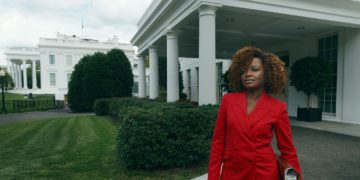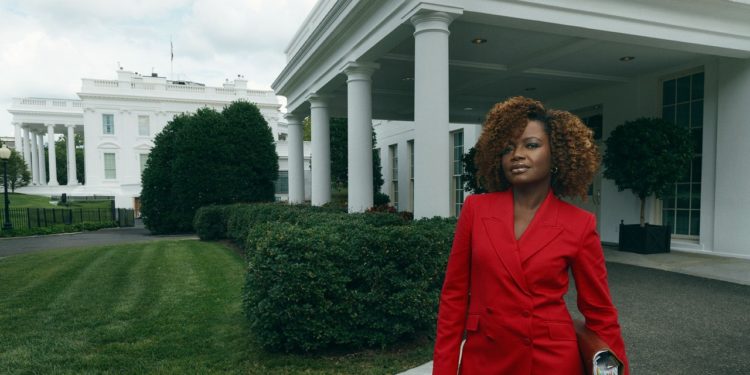The moment will forever be seared in my memory. It was December 1, 2022, at President and Dr. Biden’s France state dinner. That evening was the first time the administration felt a dinner was safe to host since the pandemic began. Every centerpiece seemed just a little bit brighter, every conversation a hair lighter. We were nearing the holidays, and the White House was adorned in sweeping ribbons and twinkling lights, making the night glow. My mom turned to me and said, “This is the happiest day of my life.”
She had never met President Biden, and never in her wildest dreams had she envisioned being at a White House state dinner, but I figured now was as good a time as any. All night long, my mom beamed—especially when she met the president, who was beyond gracious and welcoming to her. That evening was the last time I recognized my mother as the woman I grew up with. The immigrant who had worked hard her entire life. The woman who took over every room she was in, who was vibrant and forceful and stubborn and loving. In a matter of weeks, everything changed.
I was 4,000 miles from home when the text woke me up. My sister, Edwine, back in New York: “Mummy is sick. Call me.” I had flown into Poland the night before. Ukraine was months into war with Russia, and Biden had made a secret trip to Ukraine to visit Volodymyr Zelenskyy.
Despite the historic nature of the trip, a crisis at home began to consume me. My mom had been complaining of abdominal pain for a while—I still kick myself for not paying more attention. When the pain ratcheted up, my brother took her to the nearest hospital, and eventually she was taken into surgery. Although my mom would refuse to acknowledge it for another eight months, the surgery confirmed a diagnosis: She had stage II colon cancer. My mother has always been a private person. When she finally acquiesced to reality, she told me: “Don’t tell anyone. Do not tell the president I have cancer.”
“I have kept details about MY PRIVATE LIFE under lock and key. Society doesn’t allow WOMEN OF COLOR to be vulnerable at work.”
In this way, I take after my mom. For almost three years, I spent every day working in one of the most public jobs in the world: White House press secretary. My job was literally to represent the president of the United States of America. From behind the lectern in the briefing room, every day, I faced the press, the American people, and the world. And every day, I kept my personal life hidden. In fact, it won’t be until reading this that the people I have worked 16-hour days with, traveled across continents with, will learn that for almost two years, I have been silently working a second full-time job, which is navigating my mother’s care. It’s not just because I’m a private person that I withheld this information.
It’s also because I’m a first. I’m the first Black press secretary. The first person of color press secretary. The first openly queer press secretary. The first Haitian American immigrant press secretary. The first press secretary to be all of the above. Being a first meant that my responsibilities were beyond those in the job description, the load heavier. I bear a certain responsibility to the communities I represent.
In some ways, I have been carrying the weight of being a first since the moment my younger sister was born, and then my brother. I became the eldest sibling in an immigrant family with three kids—if you know, you know.
While my parents worked three jobs between the two of them just to make do, I took charge of keeping my brother and sister fed, clothed, and nurtured. I took care of them the best I could. But being used to the weight of being first does not alleviate its burden. The feeling of gravity gently tugging me down is still there, the pressure and tightness still palpable in the air. And so, since I stepped into the White House four years ago as principal deputy press secretary and then press secretary, I have kept details about my private life under lock and key. I knew—from years of being the first in various spaces and roles—that if I were to share the news of my mother’s diagnosis or any other issues in my personal life, it would be seen as an excuse. Society doesn’t allow women of color to be vulnerable at work. When you’re a first, you don’t get the benefit of the doubt.
I want to be clear: I do not regret my decision to keep my life private while in office. This piece is no apology, it’s an explanation. An explanation of who I am, what I’ve been through, and what it’s like to come from where I come from and sit in the public eye.
I never thought I’d be named the White House press secretary. That’s not me being modest—I never envisioned myself working in politics. I thought I’d wind up in one of the professions my immigrant parents expected of me: doctor, lawyer, engineer. But I fell into politics, and many roles later, here I am.
Just nine days after I was named press secretary in May 2022, a white supremacist killed 10 people at a grocery store in a predominantly Black neighborhood in Buffalo. My first time going to the briefing room, stepping up to the podium as press secretary, was to address that tragedy. Ten days later, the Uvalde shooting happened while we were on Air Force One, flying back to DC from Tokyo. It fell to me to walk to the back of the plane where the press was sitting, most of whom were sleeping in a dark cabin at the end of a long flight back with no internet, to inform them of the tragic and horrific news.
From the beginning of my time as press secretary, I navigated the typically choppy waters of American politics. Wars, unthinkable acts, crises of every kind, natural disasters, and some of the most turbulent political events in modern history. And I have also trudged through thick, thick grief.
Looking back now at the French state dinner, the signs of my mom’s decline were there. Shaky on her feet, she needed me to stabilize her. My mom spent decades of her life as a home health care aide and as the nucleus of our family, holding so many people up. Now she needed someone else to do the holding. President Biden was one of only a few people at the White House I ever told about my mom. Biden is a man who knows grief better than anyone should. He knows that grief doesn’t only occur when someone passes, but when someone changes, irrevocably, from the person you knew.
As I grieved the mom I knew, the president showed up for me. For more than 18 months, I drove up to New York every weekend I could to see my mom, often returning to DC late at night just to get a few hours of sleep before heading to the White House early the next morning (my days began with a 7:30 a.m. team call). She was in the hospital for three months. My brother visited her each morning, and my sister came on the days she could manage off from work. I did what I could from DC. My brother put me on the phone when the hospital was giving them the runaround. I demanded the names of specific doctors, told my siblings what phone numbers to track down for me so I could make calls myself. I never used my position to pull strings, but I did use my expertise, and I never stopped advocating for my mother.
Once treatment finally began, we had to change her health insurance plan four or five times so that she could get the care the doctors recommended. By the time we’d successfully get her onto a new plan, her care team would ask us why she hadn’t already started the treatment. At one point her rehab clinic tried to charge her for the wheelchair she came in with. I worked for President Obama; I am extremely proud of the Affordable Care Act. I was equally as proud to work with President Biden to lower the costs of prescription drugs and begin to tackle this country’s medical debt crisis. But our health care system is still too expensive, too hard to navigate, and too inaccessible.
As present as I was in organizing my mom’s care, I still tried to maintain a sense of privacy when I visited her. I’d wear big sunglasses, a mask, and no makeup. Unable to help herself, my mom had already bragged about me to anyone who would listen. Yet the weight of it all felt like too much. I am used to heaviness. I’ve navigated it my whole life. But I was losing my grip. I told my mom I wanted to move to New York so I could help her full-time. “You are not quitting your job,” she said, stopping me before I could finish.
I stayed in my job for my mom. Quitting the administration would hurt her more than my full-time caretaking would help. My mom and I both had the support of my brother and sister, too, who shared so much of the burden. The better part of a year ago, my mom finished treatment. That same April day, I was in New York City—of all places—traveling with the president. Ironically, just boroughs away, nurses stood around my mom after she rang the bell, cheering her on as she was wheeled out of the clinic. What I couldn’t allow to overshadow either of these things was a recent nasty story about me in the tabloids—that I couldn’t or wouldn’t do my job somehow. The next morning, I knew I’d need to get up, shake it off, and do it all over again. Because rule number one of being a first? Failure is not an option.
More Great Stories From Vanity Fair
-
Inside Prince Harry and Meghan Markle’s Big Business Ambitions, 5 Years After Their Royal Exit
-
The Sex Abuse Scandal That’s Rocking an Elite Boarding School in the Berkshires
-
In Memoriam: David Lynch Saw the Nightmare Beneath the American Dream
-
See Our Predictions for This Year’s Oscar Nominations
-
How Donald Trump’s Obsession With “Y.M.C.A.” Broke Down the Village People
-
Why Renée Zellweger “Needed to” Stop Acting for 6 Years
-
Burning at Both Ends: Surviving a Week in Wildfire-Torn Los Angeles
-
MAGA-verse’s Clash of Titans: Bannon vs. Musk
-
Prince Harry Planted a Ticking Time Bomb Under the Murdoch Empire
-
The Best Rom-Coms of All Time
-
From the Archive: Portraits of Picasso’s Marriage
The post Karine Jean-Pierre, President Biden’s Barrier-Breaking Press Secretary, Reveals Some Truths About Her Job appeared first on Vanity Fair.



















